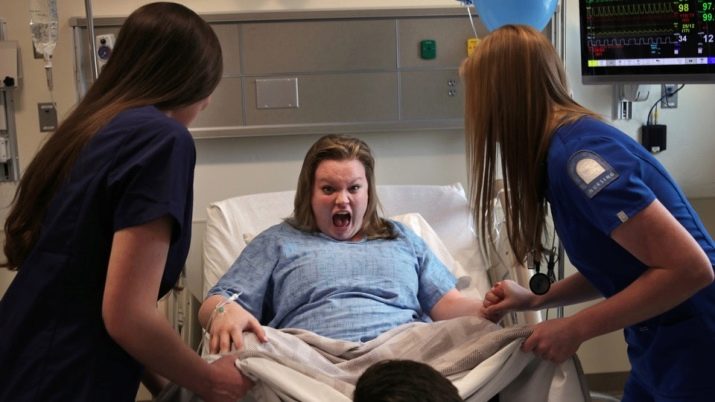Fear of pregnancy: what is it called and how to treat it correctly?

A pregnant woman looks mysterious and touching, usually her image causes only pleasant emotions in people. Many women dream of pregnancy, admit the idea that one day they will become mothers.
But all this is not about gravidophobes. This is what they call people who are terribly afraid of pregnant women or are afraid of getting pregnant.
Description
The fear of pregnancy is called gravidophobia (from the Latin gravida, which means pregnant). This is a strong, obsessive fear of expectant mothers, as well as fear of their own pregnancy.
This phobia affects both women and men.
But the representatives of the stronger sex usually manifest a phobia fear of a pregnant woman you meet, dislike for women in an "interesting position", and in women, gravidophobia is more diverse - it can be expressed both by fear of other pregnant women, and in the fear that their own unwanted pregnancy will occur.
The most difficult phobia occurs in men who are not married or have children.

Without proper professional help, they can turn into misogynists, forever remain celibate and die alone with a mass of concomitant mental disorders, because, like any other phobia, gravidophobia tends to progress.
Most often, women suffer from gravidophobia.

The fear of an unwanted pregnancy in girls and women is more common than the fear of meeting pregnant women on the street or anywhere else.
Causes
A variety of factors and events can lead to the development of gravidophobia, due to which a person has a negative relationship between pregnancy and a sense of danger.
Strong obsessive fear when meeting with pregnant women usually arises in the event that when in the distant past (usually in childhood) a person had a traumatic situation associated with the image of a future mother. For example, her own mother became pregnant and little attention was paid to the first child.

He perceived the connection between his mother's growing belly and a decrease in his own sense of security and well-being. In adulthood, such a person may have extremely unpleasant emotional associations when meeting women "in a position."
Traumatic situations also include situations when the child suffered humiliation, punishment from a pregnant woman, in this case, every time he meets women in an "interesting position", he will have a hypertrophied manifestation of the instinct of self-preservation.

The reason for the development of gravidophobia can be tragic events that happened already in adulthood - a man hit a pregnant woman while driving, he himself had a dead baby, the very first sexual contact in life ended with the onset of pregnancy, and so on.
Anyway there must be factors accompanying the situation - it is more likely that a phobia will develop in people who are impressionable, suspicious, who are in a state of chronic stress, depression.
In women, gravidophobia usually develops against the background of difficult relationships with parents, especially with mothers.
In addition, films and books can play a role in which pregnancy is presented as an ordeal, and childbirth is a painful and scary experience.

In this case, not only the fear of getting pregnant develops, but also the fear of labor pain, up to a complete refusal to have children.
The fear of giving birth to a sick baby may lie at the heart of gravidophobia in women.
The probability of just such a reason is especially high if there were cases of congenital pathologies in the family, if a woman has bad habits (she is afraid to give birth due to the systematic use of alcohol and drugs). But this option is rather rare. Under the influence of alcohol and drugs, fears are dulled, and the woman loses control over herself. That's why women from the lower social strata with a mass of bad habits so easily and often become pregnant without much effort.

Men and women can suffer from gravidophobia due to lack of confidence in their own abilities, in the fact that they can raise, feed a child.
Overly strict parenting is another common cause of pregnancy and pregnancy fear. If the parents constantly made it clear that a girl-daughter should in no case get pregnant, "don't get it from anyone," and the young man was constantly warned and urged to be careful, otherwise "he will be turned around in no time," especially impressionable natures may first have a wary attitude to pregnancy, and then fear.
In any case, fear arises as a basic reaction to a situation that seems dangerous to a person.


And it does not matter whether there is a real threat to life and health or not, the fear mechanism triggers a whole cascade of different reactions from excitement and anxiety to panic and inappropriate actions.
Symptoms
It is quite easy to recognize a gravidophobe. If on the street, in transport, in a store, he suddenly meets a pregnant woman, then hastily crosses over to the other side, leaves the bus or shop without making the purchase he needs. Images of pregnant women (photos, videos) cause anxiety in them. Men-gravidophobes treat women “in a position” with disgust, cannot communicate with them, have sex, even when it comes to their own wife.

Gravidophobic men often prefer to be lonely, do not have a family, and in case of accidental sexual intercourse, they take all possible contraceptive measures at once.
If the partner becomes pregnant, it is possible that a gravidophobe will not even think about getting married, he will simply disappear from her life, stop communicating, answer calls, and may change work and place of residence.
Gravidophobic women experience intense anxiety when talking about pregnancy, when thinking that this is possible.

They are intensely concerned with contraception issues. In case of an accidental pregnancy, they are more likely to have an abortion, no matter how their partner begs to leave the child. If a woman has gone through a negative experience, for example, gave birth to a dead baby, she can painfully, with fear, begin to relate to pregnant women around. She will try to avoid communicating with pregnant girlfriends, relatives, bypassing women "in position."
If the disorder is pronounced, it is possible that panic attacks may occur, which, when meeting with pregnant women or with the prospect of becoming pregnant, are manifested by trembling in the arms and legs, dilated pupils, increased heart rate, and surges in blood pressure.
Feeling of severe nausea, vomiting is possible.


The skin becomes pale, sweat appears on the palms and back.
Treatment
There is no way to overcome this phobia on your own, given that in a fit of fear, a person ceases to control his thoughts, emotions, behavior. WITHpsychology specialists are not helpers in this matter either.
You need to contact a psychotherapist or psychiatrist.
These specialists will help you get rid of the fear rather quickly and effectively.
The most effective today is the cognitive-behavioral method of psychotherapy., within the framework of which the specialist establishes the reasons and makes a mild psychocorrection of their consequences. Pregnancy ceases to be perceived as something dangerous, unpleasant, threatening, the attitude towards it and towards expectant mothers becomes more tolerant, calm.

Additionally, sedatives and antidepressants can be used, but the need for them arises only if the patient has signs of anxiety disorder, depression.
Hypnosis can be used for treatment - its capabilities give the doctor a chance to simulate situations for the patient in which he can communicate with pregnant women, or the girl herself is pregnant.
The methods of auto-training, deep muscle relaxation, breathing exercises are applicable as auxiliary ones. At the stage of recovery, a person is advised to communicate with pregnant women, watch films in which the heroines are expecting a baby. It is important that these films are positive, life-affirming.

Women tend to overcome fear more quickly.








